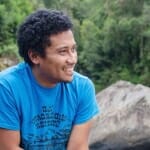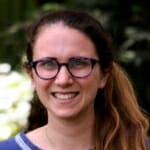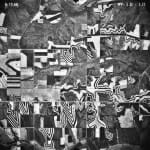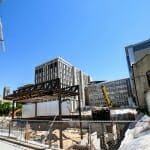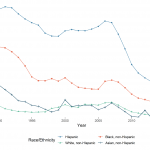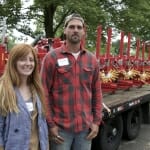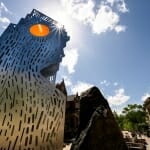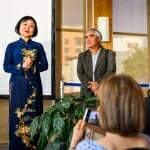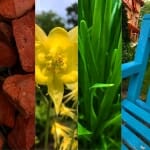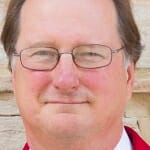Wisconsin poverty rate fell overall and for children, but rose for elderly
The statewide overall poverty rate using the Wisconsin Poverty Measure dropped from 10.8 percent in 2016 to 10.2 percent in 2017, a significant drop, but still above the 2015 rate of 9.7 percent, according to UW–Madison researchers.
Young African leaders arrive in Madison for 2019 Mandela Washington Fellowship
The University of Wisconsin–Madison welcomed 25 Mandela Washington Fellows from Africa to campus Wednesday. In addition to attending a professional and academic institute here, they will take a deep dive into Wisconsin culture.
From Helsinki to Minneapolis to Madison, scientist gives back in Madagascar
The former researcher at UW–Madison is returning to become his native country's only theoretical biologist. He uses mathematics to understand ecological problems, such as the deforestation in Madagascar.
Cellphones causing horns on millennials? Not so fast
Anthropology Professor John Hawks says the research just doesn't back up the claim behind the viral story: that a higher proportion of young men are growing horns, apparently because of cell phone use.
Starting June 27, free summer course will build STEM teaching skills
In the learning community, participants will draw on their experiences from a variety of disciplines to apply the course ideas and tackle common teaching challenges.
View from on high: UW–Madison houses Wisconsin aerial photos
Geography Department's many aerial photos vividly show Wisconsin's changing landscape since 1937.
Campus under construction this summer
An abundance of cranes and construction sites are reshaping parts of campus this summer, as part of a building boom.
Record-low fertility rates linked to decline in stable manufacturing jobs
New UW–Madison research identifies a link between the long-term decline in manufacturing jobs — accelerated during the Great Recession — and reduced fertility rates.
UW-Madison teaming up with Second Harvest to fight hunger
Helpful Harvest is a three-month pilot program that allows people to choose from available food options online.
Organic-grain field day offers ‘tremendous opportunity’ to farmers
A UW–Madison-sponsored field day and series of talks offered expert advice and encouragement for organic farmers and those who are thinking about going organic, where prices remain strong.
Research: Successful student internships require careful design
Based on student experiences at three diverse colleges, the paper describes what works in successful internships and provides demographic data on the students who take them. It also identifies key barriers to student participation in internships and recommends that more and differently designed programs be developed to meet student demand in a more equitable way.
Three companies share how UW–Madison students fit their talent needs
In the last year, nearly 8,500 companies have sought out students from UW–Madison for their talent needs. Listen to representatives from three prominent companies explain why they hire Badgers.
Sculpture portrays confluence of ideas, diversity
The new sculpture at Library Mall, titled “Both/And – Tolerance/Innovation," speaks to the confluence of ideas and cultural diversity coming together in Madison.
‘Napalm girl,’ photographer share stories
Known to the world as “Napalm Girl,” survivor turned activist and author Kim Phúc, now 56, and photographer Nick Ut, who made the Pulitzer Prize-winning photo of then-nine-year-old Phúc following a Vietnam War fire bombing, share their stories during an event on campus.
A time for two wheels
A vintage bicycle with a rusted Wisconsin license and bike basket is parked outside the Memorial Union.
UW student jobs offer opportunities in many fields
Close to 15,000 students work for the university each academic year. From working as an assistant in the Cranberry Genetics Greenhouse to serving ice cream at Babcock Hall, a wide variety of opportunities exist across all 12 schools and colleges on campus as well as over 20 other divisions at the university.
GetSocial: #PrideMonth At UW
June is Pride Month, and it's being celebrated in many ways at UW, as evidenced by this week's Get Social.
Mark Hill honored for improvements to vital computer memory systems
Hill has been analyzing and improving how computer memory functions since the 1980s. His developments became the basis of the memory models for the ubiquitous programming languages Java and C++.
UW strengthens policies to protect health and safety of youth in precollege programs
The effort will help ensure the health and safety of all youth under age 18 participating in academic programs, summer camps, sports clinics and other activities under the auspices of UW–Madison.
UW Changes Lives: Handshake increases UW student access to jobs and employers
Since July, more than 15,000 UW students have activated their personal Handshake account connecting them to thousands of job listings individually tailored to their major, interests, and skills.



